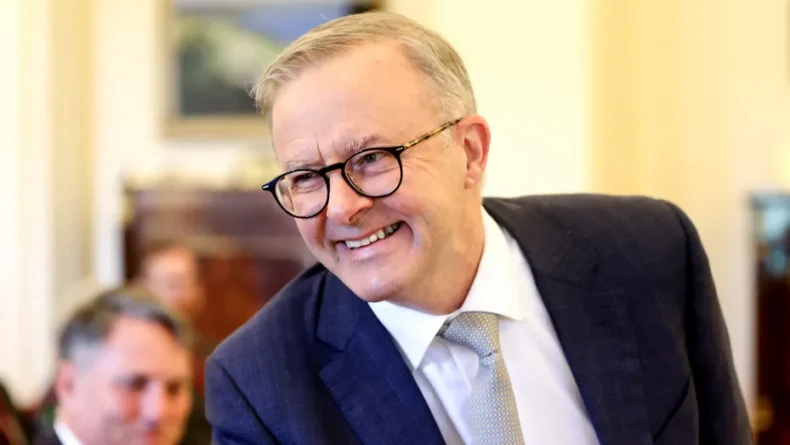On Monday, Australia’s Labor Party leader, Anthony Albanese, was sworn in as the country’s 31st prime minister before heading for Quad Meet in Japan.
Australia’s new prime minister, Anthony Albanese, was sworn in on Monday. After a contentious election campaign, he promised to bring the country together while pledging to address climate change and inequality.
After nine years in opposition, Labor regained power on Saturday after a surge of support among women and climate-focused independents, ending almost a decade of conservative rule.
“I look forward to running a government that makes Australians proud, a government that doesn’t attempt to divide, that doesn’t seek to create wedges, but strives to bring people together,” Albanese said during his first press conference after assuming that office.
Although there is time to tabulate votes and determine how the government will look, Albanese was sworn in by the Governor-General on Tuesday so he could attend the “Quad” security meeting in Tokyo.
The Quad, which includes India, the United States, Japan, and Australia, has been promoted as a potential bulwark against China’s growing political, commercial, and military presence in the Indo-Pacific.

Before the meeting with US President Joe Biden and the prime ministers of Japan and India, Albanese stated the country’s relationship with China would remain “tough.”
Richard Marles, the Deputy Labor Leader, and three senior ministers — Penny Wong, the Foreign Affairs Minister; Jim Chalmers, the Treasurer and Katy Gallagher, the Finance Minister — were also sworn in, with Wong joining Albanese on the Quad tour.
Working-class Card of Anthony Albanese
Labor’s campaign emphasised Albanese’s working-class background — he was raised in public housing by a single mother on a disability pension — and his reputation as a pragmatic unifier.
Centre-left According to television broadcasters, Labor is still four seats shy of a 76-seat majority in the 151-seat lower chamber, with a dozen elections too close to call.
ABC election analysts predicted that independents or the Green Party would gain at least 15 seats.
On a platform of environment, integrity, and equality, so-called “teal independents” campaigning in affluent, Liberal-held districts might have a huge impact.
Monique Ryan, an independent who appeared to have dethroned outgoing Treasurer Josh Frydenberg, said climate change was the most pressing issue for people in her district.
“We listened to what people wanted, their beliefs and desires, and we built a platform that mirrored that.”
Albnese also said he hoped Labor would win enough seats to govern peacefully. He had reached agreements with independents not to vote against his government in no-confidence votes. He stated that the entire ministry would be sworn in on June 1.
Official results might take many days to come in, as a record 2.7 million postal ballots are being counted.
On Monday, the election result elicited a reaction from Australian financial markets, with the effects fully priced in and no significant changes in the economy envisaged.
“Despite the change in national leadership, our economic predictions and call on the (Reserve Bank of Australia) remain intact,” Commonwealth Bank of Australia economists stated.
Read More : Ukraine, Indo-Pacific, Covid cooperation, climate pledge in Quad joint statement













